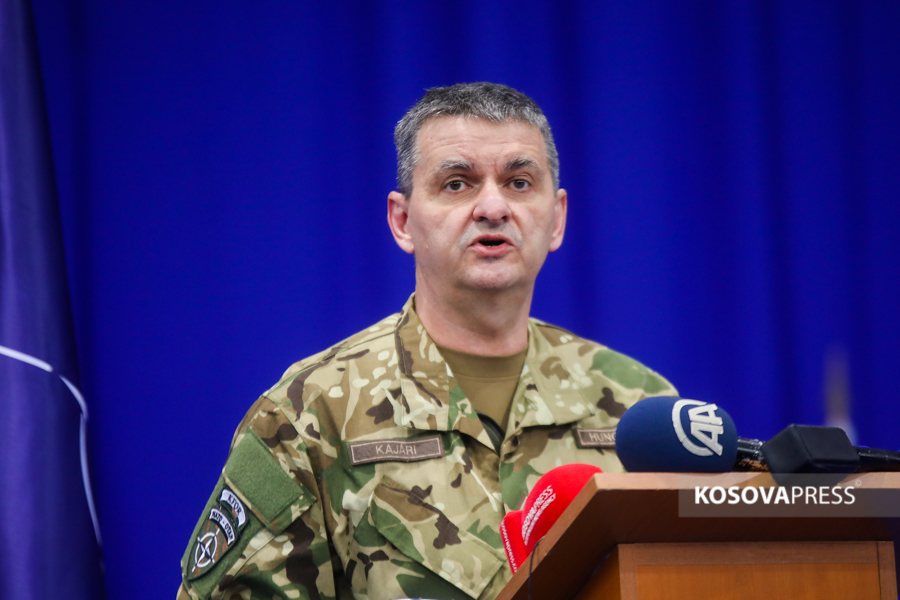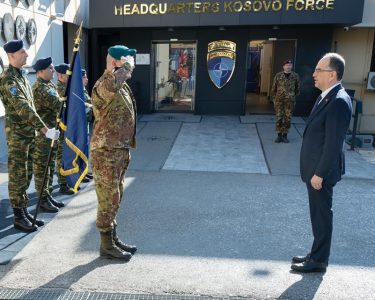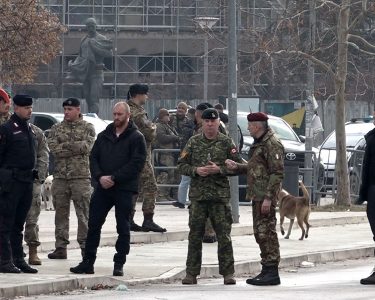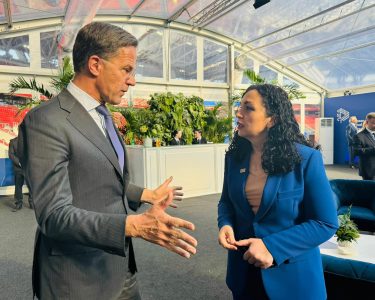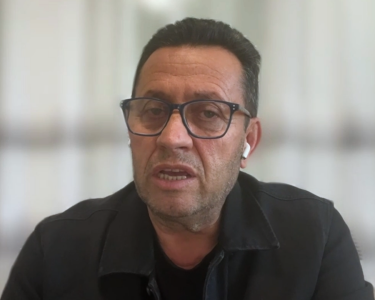Three weeks ago, Hungarian Army Major General Ferenc Kajari took over as KFOR Commander. In an exclusive interview for KosovaPress, Kajari says that the current situation is generally stable and KFOR continues to implement its mandate on a daily basis.
He says they welcome the recent agreement in Brussels that resolved the situation in the north that occurred after the imposition of the reciprocity measure on license plates. He also adds that they strongly support the dialogue and other efforts aimed at normalizing relations between Kosovo and Serbia.
Currently, KFOR consists of more than 3,700 troops from 20 NATO members and 8 partners. For Major General Kajari, this clearly illustrates NATO’s unwavering and collective commitment to regional security and stability. He adds that at present NATO has no plans to change or reduce the KFOR mission in Kosovo.
Kajar says that KFOR has a long and excellent cooperation with the Kosovo Security Force, at all levels of responsibility.
The full interview:
KosovaPress: How were your first days in Kosovo? Are you accustomed in your new assignment?
Major General Kajari: As I was preparing for this deployment, I knew from the get-go that the position of the Commander of the NATO-led Kosovo Force (KFOR) is a complex one. During the preparation I had the chance to visit KFOR two times and I saw the variety of challenges that are present in the operational area, so I was prepared for a busy period. I have to admit that the first weeks have been even busier than I have ever thought. However, the fact that all the key leaders whom I have met during this period were very supportive and welcoming and also appreciative towards KFOR and gave me a warm welcome, which made the adjustment much easier.
KosovaPress: What are your objectives during your leadership as KFOR Commander in Kosovo?
Major General Kajari: Since its establishment, KFOR has constantly adapted to meet the challenges of the changing operating environment and maintained its capability to respond with the most suitable means and capabilities to fulfil its mission. By doing so it earned the respect and appreciation of all involved parties as an impartial, reliable guarantor of security in Kosovo. My overall goal is to preserve these values and at the end of the Hungarian command year to return the post to the next KFOR Commander in a state that the unanimous acceptance of KFOR’s presence and the acknowledgment of its contribution to the safe and secure environment are maintained. KFOR capabilities are at least sustained at the current level and KFOR remains a trusted, capable third responder to security challenges. The ability of KFOR to use an approach based on the dialogue with the population and local institutions is guaranteed; however, KFOR maintains its posture unchanged to respond in a robust way, if and when necessary. I intend to put emphases on continuity, teamwork, visibility and availability. My intent is to continue on this path, build on the achievements of my predecessors and maintain the support of ongoing long-term programs, projects. Although the commander is responsible for leading his organization to accomplish its mission and he bears the sole responsibility for the success of the force and the decisions he made, I am fully aware of the tremendous expertise of the personnel the troop contributing nations are providing to KFOR and planning to build on it. KFOR’s success has been built on teamwork and I am convinced that the key to the success of my command period is to work as a team. In order to maintain KFOR’s acceptance, the force should actively engage in improvement programs, activities that are aiming to help local communities. In a crisis, KFOR should be readily available to respond within means and capabilities.
KosovaPress: How do you see Kosovo and its changes since the war and KFOR intervention in Kosovo?
Major General Kajari: In 1999, KFOR encountered a dire security environment in Kosovo. Tens of thousands of soldiers entered a devastated Kosovo, inhabited by a frightened population. Many issues existed at that time, including – amongst others – the threat of armed conflict and unexploded ordnances, shortages of water and electricity, and severe disruptions in the freedom of movement. Within a short period KFOR, in close cooperation with other international organizations, re-established order and security and in so doing it contributed enormously to the progressive return of Kosovars’ daily lives to normality. The path to stability was not easy. In the past years, Kosovo has experienced tensions on several occasions. Today, the situation is stable. Much of this is the result of the work carried out by the Kosovo Security Organizations, which have undergone an impressive development, with the support of KFOR and other actors of the International Community. Thanks to the overall improvement of the situation, KFOR could reduce its size from 55,000 in 1999 to slightly over 3,700 at the present time. Twenty-eight countries (including NATO members and partners) are now contributing to KFOR; and I can tell you – based on my daily interaction with them – that the soldiers under my command have the same spirit, commitment and enthusiasm as their predecessors. KFOR mission is the most tangible demonstration of this commitment. It continues to provide a safe and secure environment and freedom of movement in Kosovo, under the mandate of United Nations Security Council Resolution 1244 of 1999; additional to this the NATO Liaison offices in Sarajevo and Belgrade have been promoting political dialogue and carrying out practical cooperation in specific areas of interest for our partners, including strengthening their respective national security forces, institutions and structures.
KosovaPress: What should be the immediate change that the Government of Kosovo should do regarding security and stability in the country?
Major General Kajari: I will not comment on political matters. KFOR has excellent day-to-day cooperation with the Institutions in Kosovo and I am planning to maintain it throughout my tenure. KFOR’s added value rests ultimately on its impartiality and on its focus on the daily implementation of its mandate derived from the United Nations Security Council 1244 of 1999. This is key for the security of all communities living in Kosovo and for stability across the region. Of course, we are closely monitoring the situation and maintain a visible, robust and agile presence on the ground, across the whole Kosovo.
KosovaPress: How is the security situation at the national level?
Major General Kajari: The current situation is overall stable, and KFOR continues to implement, on a daily basis, its mandate I have just described to contribute to a safe and secure environment, as well as to the freedom of movement in Kosovo, for the benefit of all communities living here.
KosovaPress: What is the situation specifically in northern Kosovo?
Major General Kajar: We welcomed the agreement on de-escalation and the way forward in northern Kosovo reached between Belgrade and Pristina, under the auspices of the EU-facilitated Belgrade-Pristina Dialogue. The NATO-led KFOR mission played a fundamental, temporary role to ensure its effective implementation, in line with its UN mandate to ensure a safe and secure environment and freedom of movement for all communities living in Kosovo. NATO continues to firmly support the EU-facilitated Dialogue and other efforts aimed at the normalisation of relations between Belgrade and Pristina. This is the only path towards achieving a lasting political agreement for the region and it is key to stability across the region. Specifically KFOR maintained a temporary robust and agile presence in the area, in accordance with the achieved arrangement and in line with its UN mandate.
KosovaPress: What was your cooperation with the KSF? You know the Force since its initial mandate, whereas the Assembly has passed a law and the KSF itself is going through a phase of transition to become an army. Were there any obstacles in your relations with the Force?
Major General Kajari: KFOR has a long-standing, excellent cooperation with the Kosovo Security Force, at all the levels of responsibility. I have already met the key leaders of KSF and congratulated them on the excellent EOD, disaster relief and hazardous material handling capabilities of the KSF. I also expressed my intention to continue the cooperation with KSF according to their original mandate.
KosovaPress: What is the current capacity of KFOR in Kosovo and is it expected to increase the number of soldiers in the near future?
Major General Kajari: Currently, KFOR consists of more than 3,700 troops from 20 NATO members and 8 partners. This clearly illustrates the steadfast, collective commitment by NATO to regional security and stability. For the time being NATO has no plan to change or reduce KFOR mission in Kosovo. The achievements of the NATO-led KFOR mission are regularly assessed, and based on that all Allies agree that we should maintain the current strength of roughly 3,700 troops. Any decision on a possible change in the number of soldiers present in KFOR will be taken only by the North Atlantic Council and as a result of a change in the general security situation.
KosovaPress: More than two decades have passed since the war, do you think there is still a need for KFOR presence in Kosovo? How long do you think this mission in Kosovo will last?
Major General Kajari: The mandate of KFOR given by the UN Security Council Resolution 1244 remained unchanged ever since its establishment. The posture of KFOR however, regularly have been assessed and have been adjusted to the extant security situation. As the security situation improved in our operational area and as the Institutions in Kosovo became more and more capable the number of deployed KFOR troops have been decreased to the level sufficient to accomplish the mission. KFOR operations are not calendar driven, its presence and posture is determined by the conditions within the operational area. KFOR will conduct its mandated tasks and contribute to the safe and secure environment and ensures freedom of movement as long as it is deemed necessary by the North Atlantic Council.


